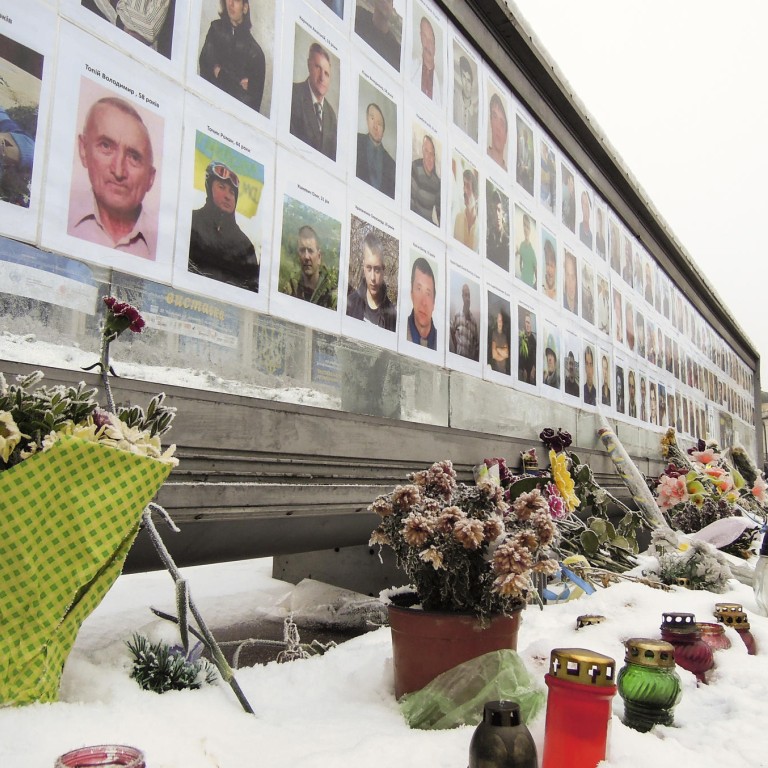
Bloodier than Occupy, Kiev protests sowed seeds of real change
There are echoes in Hong Kong's 'umbrella movement' of the Euromaidan street protests in Ukraine against an unpopular leader, but also obvious differences, starting with what both achieved. Words and pictures by Joyce Man
For Daria Mykhailova, the story appeared to end as logically as it had begun.
Winding down after a day of studying on November 21, 2013, Mykhailova scrolled through her Facebook feed to find, nestled between posts documenting the minutiae of her friends' lives, an unusual note from Hromadske TV reporter Mustafa Nayem, a call to arms of sorts: "Let's meet at 10.30pm near the monument to independence in the middle of the Maidan."
Earlier that day, President Viktor Yanukovych had backed down from an agreement to associate more closely with the European Union. Mykhailova, like many Ukrainians, was outraged.
"For years, we were working towards Europe," she says. "Within one day, everything had changed." There was nothing else for her to do. "I just felt I couldn't stay at home."
Mykhailova and hundreds of others converged on Maidan Nezalozhnosti, the central square in Kiev, in a protest that would balloon to include hundreds of thousands of people and spread to Lviv, Ivano-Frankivsk and Chernivtsi in the west and elsewhere in Ukraine.
From that night through to February last year, the student of international relations at Taras Shevchenko University set aside her books and learned about politics as it unfolded in vivid real time on the square, an alternative universe filled with sulphur dioxide from burning tyres, Berkut riot police and twenty- and thirty-somethings in improvised body armour. Armed with Facebook, HK$80 mobile phones and punchy hashtags such as #ridetomaidan, the teenager, born three years after the Soviet Union's collapse, learned how to coordinate buses and housing for hundreds of protesters from out of town.
Then, on February 22, the president suddenly fled. And with the same clarity of mind that she had had when she arrived, Mykhailova left the square.
"For me, that was the logical conclusion of Maidan," she says. Besides volunteering for a telephone helpline, there was nothing more to be done but go home, and fall into a deep slumber.
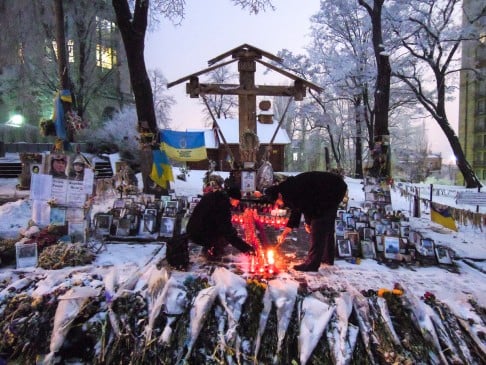
families, friends, lovers and tourists lazily meander where once there were broken-up roads, makeshift barricades and shards from Molotov cocktails. But Kiev has not forgotten. Candles, carnations, photos of the dead and spontaneous renditions of the national anthem are all caught up in snow flurries that resemble those that blanketed the protestors here at the turn of last year.
Ukraine is currently commemorating the first anniversary of "Euromaidan". The movement started peacefully but turned bloody as police and demonstrators, including the ultra-nation-alist group Right Sector, resorted to violence. According to the Ukrainian Ministry of Health, 106 people died as a result between November 30, 2013, and April 14 last year. Activists say this figure has been under-reported. In the aftermath, fighting broke out in the eastern Donbass region as pro-Russian separatists took up arms. In March last year, Russia annexed Crimea, a peninsula in the south of Ukraine, following a widely criticised referendum.
In many respects, Kiev feels worlds away from Hong Kong, but a little under a year ago, Maidan's protesters were facing similar questions to those now confronting the children of the "umbrella movement": with the tents and barricades cleared away, how could momentum be sustained towards the goals they risked so much - arrest, safety, comfort, careers and relationships - to achieve? And perhaps more perplexing: what did it all mean?
Maidan and Occupy Central seem to invite comparison: both were struggles against the influence of a current or former communist superpower and leaderships that were seen as self-serving. In both, students and young people played a central role, imbuing their movements with the hallmarks of their tech-savvy generation: demonstrations of solidarity by smartphone glow and situation reports that travelled through likes, retweets and shares on social media. Both ran for months and spawned civil action and a new sense of identity and unity. In both, language politics played a role. In the words of Pavlo Kalyuk, who joined Maidan because he wanted a better future for his children, there was "something shared, a basic understanding" - enough to prompt him to don a yellow jacket in support of democracy in Hong Kong on Facebook on Chinese National Day.
But Euromaidan the umbrella movement is not. At the outset, Ukraine had a weak civil society and was beset by rampant corruption. Maidan turned deadly. The "Heavenly Hundred" who sacrificed their lives have ensured that those who survived will remember what they fought for. The end of Maidan gave way to an even bloodier conflict and, importantly, it achieved something major: the ousting of Yanukovych.

The erstwhile tent dwellers of Admiralty, Mong Kok and Causeway Bay can cite no such clear victory, though they may have forged a new unity and wider support for the pro-democracy camp. And the yellow umbrellas were opened in a city with a strong rule of law.
Furthermore, Occupy ended (assuming it has, in fact, done so) on a lacklustre note; only 27.8 per cent supported the protest and 54.7 per cent opposed it a month before its close, according to a survey by the University of Hong Kong. By contrast, a poll by Kiev-based social and marketing research company Socis found that 47 per cent of respondents supported Maidan a month before its conclusion.
The coming months will tell what these differences mean for the movement in Hong Kong but in Ukraine, one year on, a euphoria lingers. A pro-Western parliament has been elected. Despite the passage of time and fighting in the east, protesters are reflecting on a revolution of dignity and are realising a common identity irrespective of geographical origin - east or west - or mother tongue - Russian or Ukrainian. Many, including Mykhailova, her friend and classmate Evelina Ibrayimova, 19, and Karina Lazaruk, a student at the Ukrainian Catholic University from Lviv, speak of a "revolution of the mind", a sea change in the way those who participated think.
Maidan, Mykhailova says, as she and Ibrayimova reminisce one recent morning at Kupidon, a café near the square frequented by activists during the protests, "was a trigger in people's heads".
"They got to see a society that worked in practice and take part in the volunteer movement. A trust developed and people could see changes."
Andriy Kohut, co-founder of activist group Civic Sector, says Maidan made people realise they could change something.
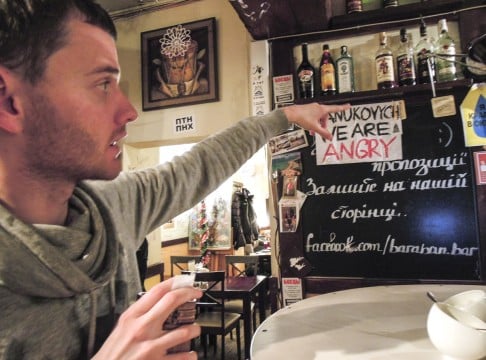
"It was like a laboratory," he says, from a room that served as his group's makeshift control centre last year. "People tried to improve the situation. New initiatives, volunteer groups and organisations appeared as a result. As a community, we now have experience in working on these initiatives together."
Maidan, they all say, has given birth to a culture of self-reliance, connectivity, volunteerism and charity. Take marketing director Alyona Zlobina. During Maidan, she and her friends provided food and donations, and supported protesters in hospitals. In a similar vein, they have started organising charity flea markets, including one last month that drew about 6,500 visitors and 450 vendors, and raised 260,000 hryvnia (HK$126,000). As a nation, Zlobina says, Ukraine has become more generous and, through Maidan, it has cracked open a window to Europe.
"We've become louder, more open, braver."
Nowhere is this spirit more evident than in Lviv, in the far west of Ukraine. On a recent Tuesday, a group of elderly women and schoolchildren gathered to create snow camouflage for tanks and snipers fighting in the east by knotting donated white cloth onto fishing nets.
"We're not the only group doing something like this. People want to contribute and aspire to higher values," says Konstantin Kovalishin, who helps Svetlana Bozhko, the founder of Hand Made Lviv, which also produces balaclavas, jumpers, gloves and borsch mix for soldiers.
Initiatives have had a humorous twist at times. Lviv Chocolate Factory, for example, has created Vladimir Putin figurines with devil horns and the product name "PTN-PNKh", an acronym for the Ukrainian phrase that means "Putin go f*** yourself", a not-so-subtle jab at the Russian president, who has been accused of meddling in Ukraine.
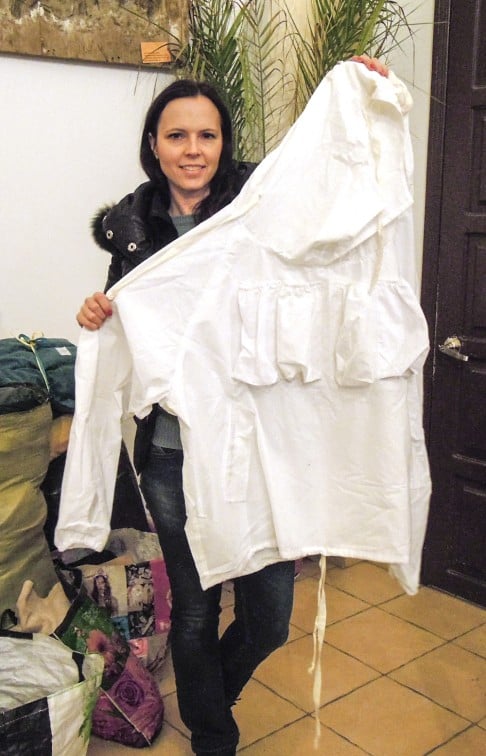
The idea the nation's progress will derive from personal and community improvement is gaining credibility.
"To win a war, we need to do more than just fight," says Oleg Matsekh, a representative of Civic Sector in Lviv and a trader of stomatological instruments who recently paid for a local lion statue to be restored and for a train to the southern city of Odessa to be decked out in plaid print, stuffed animals and the message "Peace, only peace".
"If we continue believing in an eye for an eye, we'll all just end up with no eyes. We need to fight aggression with love and laughter. It might sound funny, but it's true," Matsekh says, speaking in Svit Kavy, a popular Lviv café. He interrupts the conversation to confirm a shipment of donated television sets being sent to soldiers. "A lot of new community initiatives have appeared since Maidan."
One movement embodying this resolve is the Samopomich (literally "self reliance") political party, which came in third, with 33 seats, in October's parliamentary election and is headed by Lviv mayor Andriy Sadovyi. To get a sense of the new political force of Ukraine, one only has to look to the fresh young face at Samopomich's centre.
Hanna Hopko, 32, has all the makings of a new generation of politicians. She cut her teeth as a journalist before rising through various advocacy posts to become a board member of the Anticorruption Action Centre. In October, Hopko, whom demonstrators recall seeing on Maidan, won a seat in the Verkhovna Rada, Ukraine's parliament. Hopko envisions a country in which civil society plays a key role, political competition thrives, power remains decentralised and professionalism and expertise prevail.

"The new paradigm will be a horizontal government," she says, in the lobby of Hotel Ukraina, which, during the protests, served as a morgue and hospital.
"Samopomich is not a party. It's a movement," says Hopko, who sees herself as a participant rather than a member. "We are about self-reliance. You have to take responsibility for yourself. You cannot rely on the president, the prime minister, the parliamentary speaker … "
For Hopko and many activists, that also means not relying on the European Union. Hopko does not see closer association with Western Europe as a panacea, or Ukraine merely as a beneficiary.
"By investing in Ukraine," Hopko says of the EU, "you're investing in the stability of the region. You're not helping Ukraine. You're helping yourselves."
Media and activists have speculated that Sadovyi has ambitions for the presidency and that Samopomich may just be his branding platform. Hopko acknowledges those opinions but believes in the movement as something more.
"I see Samopomich as an opportunity where a new generation of state builders, who are motivated and professional, can grow."
For now, activists remain cautiously optimistic about parliamentary representatives such as those from Samopomich, but in a country that has experienced its fair share of political intrigue during its short independence and where parliament often descends into fist fights, any optimism is precious.
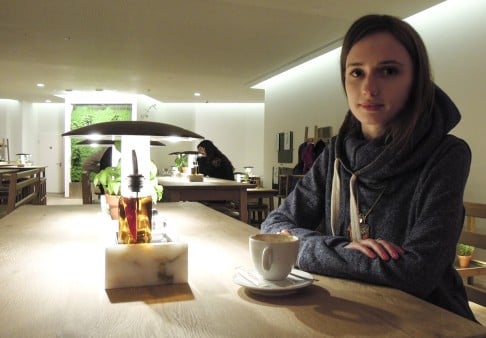
Kohut points to political parties and groups that, like Samopomich, comprise former participants of Euromaidan as a step forward.
"The idea that such politicians could appear would not have been possible a year ago," he says. "At least they are going in the right direction."
Regardless of how activists see Ukraine's relationship with the EU, the country's future will depend heavily on what course of action the union, and particularly Germany, at its helm, takes. If Chancellor Angela Merkel's recent rhetoric is anything to go by, Ukraine could expect a tougher stance in months to come.
Germany has emerged as the regional leader during the euro crisis, with France now playing a secondary role. Dmitri Trenin, director of the Carnegie Moscow Centre, says by email that Germany's hardening stance stems in part from the country's reassessment of its key relationships, including those with the United States and Russia, during its own "peaceful rise".
Despite the hope blossoming in Ukraine, the country's woes are never far from the minds of its people. The ongoing crisis has taken its toll on the economy, with the hryvnia having dropped 50 per cent against the US dollar last year and inflation standing at around 20 per cent. The economy contracted by 7.5 per cent in 2014. Prosecutors say Yanukovych took US$100 million from Ukraine's coffers - an accusation seemingly supported by revelations of opulent chambers, a sprawling car collection and more at his Mezhyhirya estate following his flight.
Despite a ceasefire in September, the situation in Donetsk and Luhansk, in the eastern Donbass region, remains volatile. On December 26, peace talks broke down in Minsk. Meanwhile, Ukrainian Railways shut off its service to Crimea.
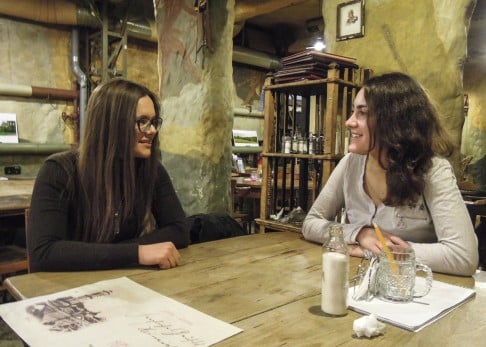
For Lena, Euromaidan made absolutely no sense.
"If those protesters could only have waited until the elections, they could have voted for change through the ballots," she says, by phone. Presidential elections had been scheduled for this March. "Then there wouldn't have been a war."
There can be no doubt that Ukrainians of all political stripes and backgrounds have paid a heavy toll over the past year, on Maidan and off. More than 4,700 have been killed and 10,300 wounded in a conflict that has affected more than 5 million since mid-April last year, the United Nations said last month. UN figures from mid-December show more than 610,400 have been internally displaced while asylum seekers to neighbouring countries including Russia have reached nearly 593,600.
Crimean Tatars are a group that has been especially affected. Khalil Khalilov, founder of Art Center Crimea, which supports the development of Crimean Tatar music and other art forms, decided he had to leave the peninsula after Russia took over.
For Khalilov's family, there has been a sense of déjà vu. Like many Crimean Tatars, his grandparents were deported by Soviet dictator Josef Stalin to Uzbekistan in 1944. Born and raised in Tashkent, Khalilov had never seen Crimea until 2003, but his grandfather had passed on his nostalgia for the fabled place. Eleven years ago, Khalilov, 37, and his wife moved to the land of his ancestors.
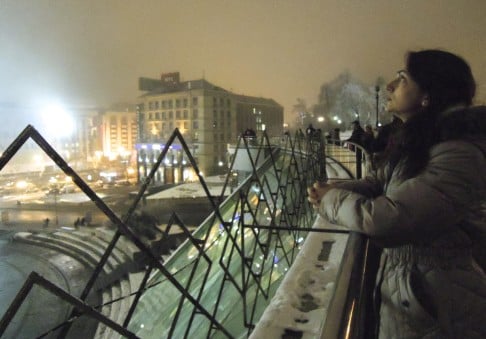
Yet in May, he was advised by an official to leave because, without taking Russian citizenship, as Crimean residents must now do to receive state services, he would not be able to work.
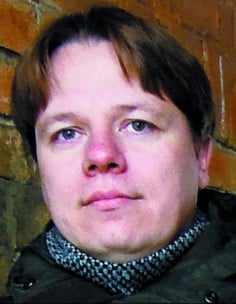
"For me, culture is too important," Khalilov says, in Lviv, where he is now collaborating on jazz projects and supporting other Crimean Tatars through the organisation Krym SOS. "I refuse to take Russian citizenship because I am Ukrainian, and Crimea is a part of Ukraine.
"I'll wait 10 years, 20 years. No matter how long it takes to get back home to Crimea."
As 2015 begins, the people of Ukraine seem to be hunkering down for lengthy challenges - Hopko in parliament, the volunteers in Lviv, Lena in Kharkiv, negotiators in the peace talks and soldiers in Donbass.
"Put it this way: Ukraine is a very, very sick patient," says Kalyuk. "We've managed to remove the tumour. Now we need to keep medicating."
For Mykhailova, the end of Maidan turned out to be just the beginning, a sentiment that many in Hong Kong's "umbrella movement" can probably identify with. Departing from Maidan has not meant abandoning the movement.
"Maidan is an idea in your heads. You can leave, and take it with you."
